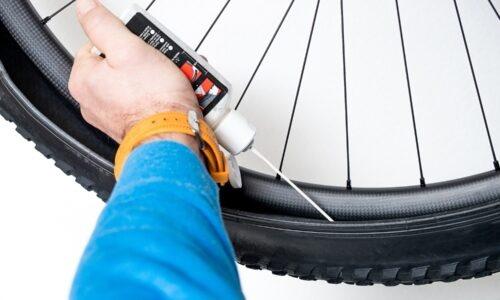Bikes are not just fun to ride, but it’s also great to work on. There’s nothing like fixing or upgrading your bike and then going out and enjoying the fruits of your labor.
Our amazing readers often ask a question when it comes to upgrading a bike: “How to convert downtube shifters to STI shifters?”.
Although it might seem like a simple task, it is actually fairly challenging. It’s not as simple as just fitting them, and they will work.
In this article, we’re going to break it all down and tell you how to convert them and everything you will need. Here’s what we will be discussing:
- What Are Downtube Shifters?
- What Are STI Shifters?
- Why Would You Want To Convert From Downtube To STI?
- What Would You Need To Convert Downtube Shifters To STI?
- Our Step By Step Guide On Converting Downtube To STI Shifters
What Are Downtube Shifters?
Downtube shifters are what you typically see on classic bikes, mainly road bikes. They are called downtube shifters because they are located on the downtube, away from the brakes and other components. They work in a lever function and control the front and rear derailleurs.
The majority of these shifters are friction shifters and generally are not indexed, meaning you have to find the gears yourself. They are incredibly reliable and very easy to set up and use.
What Are STI Shifters?
STI stands for Shimano Total Integration. These shifters are also known as brifters.
It is where the brakes and the shifter are all together in one single unit. You don’t have to remove your hands from the brakes to change gear. It’s what modern road bikes all now use.
STI shifters are very easy to use, and although they can be a little more challenging to set up, they add so much to the cycling experience. We highly recommend these if you are using a road or gravel bike.
Why Would You Want To Convert From Downtube To STI Shifters?
There are a huge amount of reasons you should go from downtube to STI shifters. I have done this with many of my personal bikes, and here’s why:
Ease Of Shifting
STI shifters are much easier to use compared to downtube shifters. Not only do you not have to remove your hands from your brakes, but they are indexed, meaning you don’t need to find the gear yourself.
Performance
Lifting off the brakes to find the correct gear takes time, and that could be the difference in a race. Those valuable seconds are everything to some riders, and you wouldn’t see a professional in modern times on downtube shifters.
Better Hand Position
STI shifters also offer a much better hand position than the brakes combined with downtube shifters. It’s much more ergonomic and feels much better on the hands.
Looks
Finally, the last thing to mention is looks. The STI shifters are the way to go for a cleaner-looking bike. Although it’s not everything, we all love our bikes to be Instagrammable.
What Would You Need To Convert Downtube Shifters To STI?
When it comes to converting from downtube to STI shifters, there are some tools and components you are going to need to have ready:
Tools
- Allen Keys
- Cable Cutters
- Screwdriver Set
- Spanner Set
- Crank Puller
Components
- STI Shifter Set
- Derailleurs To Match
- Crankset To Match
- Downtube Shifter To STI Cable Stops
- Cable Inners And Outers Gear
- Cables Inner And Outers Brake
- Bar Tape
- Add On Hanger (Optional)
Our Step By Step Guide On Converting Downtube To STI Shifters
Now for the exciting part, let’s start working on the bike. We recommend reading through the whole guide before ripping your bike apart, as it’s not always as simple as a direct swap.
Step One: Remove The Old Downtube Shifters
The first thing we need to start doing is removing the old downtube shifters. Cut the cables, then take the screwdriver and undo the shifters on either side.
They should fall off after unscrewing. If you find that you have the old style with a bolt, undo this with the appropriate spanner, and it will drop out.
Step Two: Remove The Derailleurs And Crankset
Next, we are going to need to remove the derailleurs. On the rear, you must either use the Allen keys or the spanner set to undo the bolt on the hanger.
Some rear derailleurs leave the dropout without a hanger. If this is the case for you, you must use an add-on derailleur.
Then you must remove the front derailleur and move on to the crankset. On older bikes, there are a few different ways to remove them. Typically you will need to use a crank puller to release the crank.
Step Three: Install New Crank And Derailleurs
Now you are going to need to install the new crank. Typically you will pop each side of the crank on and need to screw them up to the correct torque. Consider a new bottom bracket if your crank doesn’t fit.
Then the derailleurs. The front derailleur should go straight across, and you will want to sit the cage about 2mm about the largest chainring. The rear derailleur should go straight on the hanger or the add-on hanger.
Step Four: Install The STI Shifters
Next, we need to start installing the shifters themselves. You will need to remove the bar tape on each side, and the brakes will also need to come off. This typically undoes with a small Allen key bolt behind the lever.
Now it’s time to install the shifters. Ensure you get the right shifter on the right side and the left on the left.
Once they are on, tighten them up with the small pinch bolt inside but don’t worry if they are not perfect. We can adjust them later.
Step Five: Add Inner And Outers And Adjust
Let’s now link the whole system together. Start by cabling the brake inners and outers and adjusting them so they give you the correct tension. Once adjusted, cut the cable ends off.
Before we work on the gear cables, you need to add the cable stops. These will help guide the cables. These will go where the old downtube shifters are attached.
If you haven’t got any, you need to get creative. Many people drill the old shifter making them into cable stops as we did here.
Now add the cable for the gearing. Once added, you will need to adjust them and have the gear indexed correctly. Once indexed, cut the ends and add cable stops.
Step Six: Finishing Touches
Next, we need to put all the final finishing touches. We recommend starting by checking that everything is nice and tight and shifts and brakes as it should. Don’t be shy about testing it on a quiet road.
Once happy, you must adjust the shifters to be level and at the correct position for your riding. Then tighten them up and bar tape the system so it’s grippy and looks great.
A Final Note
Well done! You should now have STI shifters on your bike. We hope you enjoyed our guide and are now excited to get out riding to enjoy a better shifting experience.
Read also:
- Revamping Your Retro Ride: A Step-by-Step Guide to Upgrading an Old Bike with Modern Components
- How To Convert From Quill To Modern Threadless Stem [With A Quill Stem Adapter]

Robbie Ferri has spent years working in a bike shop, has worked with industry leading brands on product creation, has been a semi pro athlete, and is a fully qualified strength and conditioning coach. He has broken World Records, bikepacked all over the World and raced ultra distance at a top-level.








